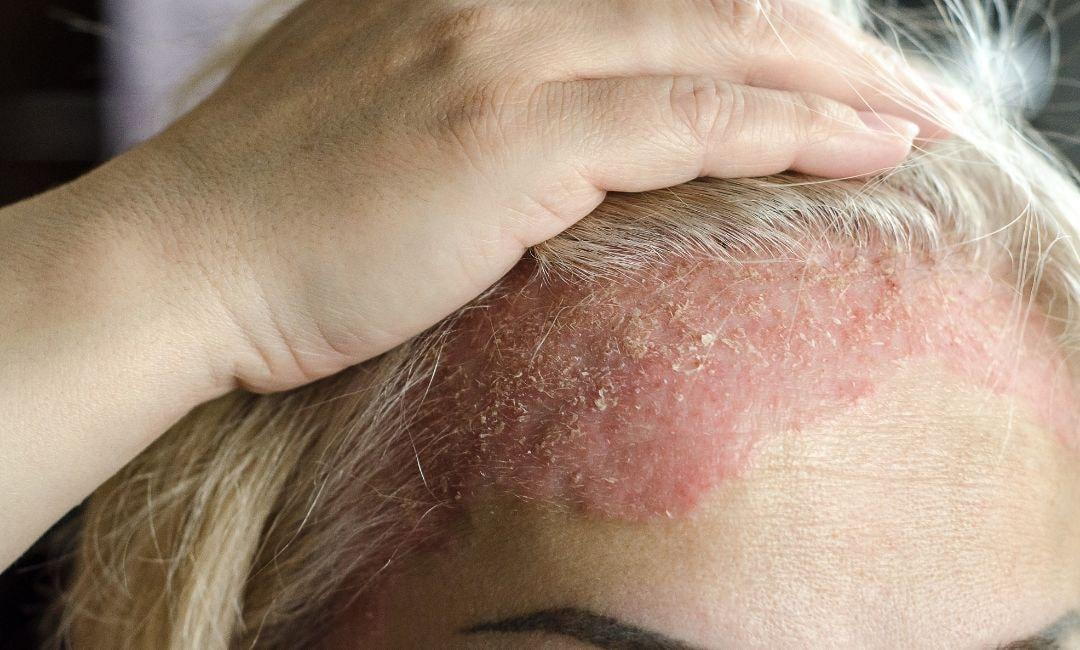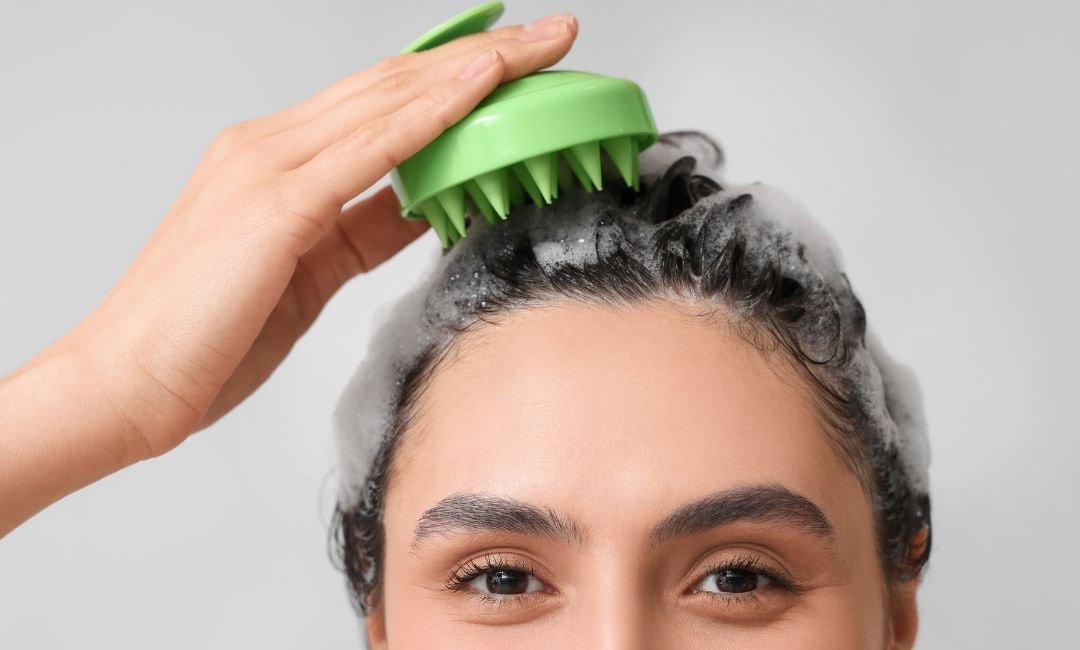How to Treat Eczema on Scalp

- posted: Sep. 12, 2024
Scalp eczema can make you want to tear your hair out literally. The constant itch, the embarrassing flakes... it's enough to make anyone feel self-conscious. But guess what? You're not alone. Millions struggle with this pesky skin condition, and we're here to help you take back control.
In this guide, we're going to get down to the nitty-gritty of scalp eczema, breaking down everything from the root causes to proven treatment options. We've even tapped into the expertise of a board-certified dermatologist to bring you the best advice available. Here’s what we’ll cover:
Understanding Scalp Eczema: We’ll talk about the science behind this condition and why it happens.
Identifying Your Triggers: Learn to recognize the things that set off your flare-ups, so you can dodge them like a pro.
Effective Treatment Options: We’ll explore everything from over-the-counter remedies to prescription medications that provide relief.
Lifestyle Tweaks: Discover simple changes you can make to your daily routine that can make a world of difference.
And if you're in the Fort Lauderdale area, Dr. Will Richardson and his team at Natura Dermatology & Cosmetics specialize in treating all types of skin conditions, including scalp eczema. We offer a personalized approach to care and can help you achieve long-term relief.
So, What is Scalp Eczema, Anyway?
Scalp eczema isn't just one thing. It's an umbrella term for several conditions that cause your scalp to become inflamed, itchy, and flaky. Think of it as your scalp's way of throwing a temper tantrum.
The usual suspects include:
Seborrheic dermatitis: This one's a bit of a mouthful, but it basically means you have an overgrowth of yeast on your scalp. It loves oily areas, so it often shows up on your scalp, eyebrows, and even around your nose.
Atopic dermatitis: If you have a history of allergies or asthma, this might be your culprit. It's a chronic condition that can cause dry, itchy patches all over your body, including your scalp.
Contact dermatitis: Ever tried a new shampoo and ended up with a rash? That's contact dermatitis. It's an allergic reaction to something that touches your skin.
But why me?
We hear you. It's frustrating to deal with scalp eczema, and you're probably wondering why it chose you. Well, the truth is, it's usually a combination of factors. Genetics, stress, weather changes, and even certain hair products can all play a role.
The telltale signs:
Itching: This is usually the first and most annoying symptom.
Redness and inflammation: Your scalp might look angry and irritated.
Flaking: Think dandruff, but on steroids. The flakes can be white, yellow, or even greasy.
Scaly patches: In severe cases, you might develop thick, crusty patches on your scalp.
Don’t let scalp eczema steal your shine.
At Natura Dermatology & Cosmetics, we believe everyone deserves a healthy, happy scalp. Our team of experts is dedicated to helping you find relief from scalp eczema and restore your confidence.
Identifying Your Eczema Triggers
Consider your scalp eczema flare-ups as a crime scene. Your mission? To uncover the culprits behind those itchy, flaky outbreaks. Now, we're not talking about dusting for fingerprints, but rather paying close attention to your daily routine and environment.
Common Triggers
Stress: We all know stress isn't good for us, but it can be particularly brutal on your skin. When you're stressed, your body releases hormones that can trigger inflammation, making eczema worse.
Dry Air: Whether it's winter's chill or blasting the AC, dry air sucks the moisture right out of your skin, leaving your scalp parched and prone to flare-ups.
Harsh Hair Products: Sulfates, fragrances, and other harsh chemicals can irritate your scalp and trigger eczema. It's time to ditch those fancy shampoos and opt for gentle, fragrance-free alternatives.
Heat and Sweat: Working up a sweat at the gym or spending time in hot, humid weather can worsen eczema symptoms. Make sure to shower and gently cleanse your scalp after sweating.
Certain Foods: While it's not always the case, some people find that certain foods trigger their eczema. Common culprits include dairy, eggs, nuts, and gluten.
Keep a Trigger Diary
Grab a notebook or use your phone to track your flare-ups and what might have caused them. Note down things like:
What you ate that day
Any new hair products you used
Stressful events or situations
Weather conditions
Pro Tip: Identifying your triggers takes time and patience. Don't get discouraged if you don't figure it all out right away.
Once you know what triggers your eczema, you can take steps to avoid those triggers and keep your scalp happy and healthy. If you need a little extra help, the experts at Natura Dermatology & Cosmetics can help you create a personalized plan to manage your triggers and prevent flare-ups.
Effective Scalp Eczema Treatments
Now that you understand your triggers, let's get down to brass tacks—how to actually treat that pesky scalp eczema and reclaim your scalp's serenity.
Over-the-Counter Heroes
You might be surprised to learn that some effective treatments can be found right on your drugstore shelves. Here are a few go-to options:
Medicated shampoos: Look for shampoos containing ingredients like ketoconazole, selenium sulfide, or pyrithione zinc. These help combat yeast and inflammation, giving your scalp some much-needed relief.
Tar shampoos: Coal tar has been used for ages to treat scalp conditions. It slows down skin cell growth, which can help reduce scaling and itching. But fair warning, it can have a strong odor and might stain light-colored hair.
Salicylic acid shampoos: This ingredient helps break down those thick, scaly patches, making them easier to remove.
Prescription Powerhouses
Sometimes, over-the-counter options just don't cut it. That's where prescription medications come in.
Topical corticosteroids: These are anti-inflammatory creams or ointments that reduce redness, itching, and swelling. They're often used for short-term relief during flare-ups.
Topical calcineurin inhibitors: These medications work by suppressing your immune system's response, which can help calm down inflammation. They're a good option if you have sensitive skin or need long-term treatment.
Natural Remedies: Worth a Shot?
If you're looking for a more natural approach, there are a few options to consider:
Apple cider vinegar: Diluted apple cider vinegar can help balance your scalp's pH and fight off yeast.
Coconut oil: This natural oil has anti-inflammatory and moisturizing properties that can soothe irritated skin.
Tea tree oil: This essential oil has antifungal and antibacterial properties that can help reduce inflammation and fight fungal infection. But be sure to dilute it before applying to your scalp.
Every scalp is unique. What works for one person might not work for another. If you're struggling to find relief, don’t hesitate to reach out to a professional. The team at Natura Dermatology & Cosmetics can assess your specific needs and recommend the most effective treatment plan for you.
Lifestyle Hacks: Small Changes, Big Impact on Your Scalp

While medications and treatments are important, don't underestimate the power of lifestyle tweaks. These simple changes can make a world of difference in managing your scalp eczema.
Gentle Hair Care is Key
Shampoo less frequently: Overwashing strips your scalp of its natural oils, leaving it dry and prone to irritation. Aim to wash every other day or even less often if your hair type allows it.
Choose the right shampoo: Look for gentle, fragrance-free shampoos specifically designed for sensitive scalps. Avoid those with harsh sulfates, parabens, and artificial fragrances.
Condition with care: Conditioner can help keep your scalp hydrated, but apply it only to the ends of your hair, not directly on your scalp.
Avoid hot water: Hot water can dry out your skin, so opt for lukewarm showers or baths instead.
Stress Less, Live More
Find healthy ways to manage stress: Stress is a major trigger for eczema, so it's important to find ways to relax and de-stress. Try yoga, meditation, or spending time in nature.
Get enough sleep: Lack of sleep can weaken your immune system and make you more susceptible to flare-ups. Aim for 7-8 hours of quality sleep each night.
Other Helpful Habits
Humidify your home: Dry air can wreak havoc on your scalp. Using a humidifier, especially during the winter months, can help keep your skin hydrated.
Avoid scratching: We know, it's easier said than done. But scratching can damage your skin and worsen inflammation. Try applying a cold compress or using over-the-counter anti-itch creams for relief.
Wear loose-fitting hats: Tight hats can trap heat and sweat, irritating your scalp. Opt for breathable fabrics and avoid wearing hats for extended periods.
Consistency is key when it comes to managing scalp eczema. Stick to your treatment plan and make these lifestyle changes a part of your daily routine.
FAQs
What triggers eczema on the head?
Imagine your scalp as a delicate ecosystem. When things get out of balance, eczema can flare up. Some common culprits include:
Stress: We get it. Life can be a bit extra sometimes. Stress releases hormones that can trigger inflammation, making your eczema go haywire.
Dry air: Ever notice how your scalp feels drier in the winter or when you're blasting the AC? Dry air saps moisture from your skin, leaving it irritated and itchy.
Harsh hair products: Those fancy shampoos loaded with fragrances and chemicals might smell great, but they can wreak havoc on your scalp. Opt for gentle, fragrance-free products instead.
Heat and sweat: Working up a sweat at the gym or spending a day in the sun can worsen scalp eczema symptoms. Make sure to shower and gently cleanse your scalp afterward.
Certain foods: While it's not a one-size-fits-all situation, some people find that certain foods, like dairy, eggs, nuts, or gluten, can trigger their eczema. Keeping a food diary can help you pinpoint any dietary culprits.
What is the difference between eczema and dermatitis on the scalp?
Here's the deal: "eczema" and "dermatitis" are often used interchangeably, but they're not exactly the same thing.
Eczema is a broad term that covers several skin conditions causing skin inflammation, itching, and dryness.
Dermatitis specifically refers to inflammation of the darker skin. So, in a way, scalp eczema is a type of seborrhoeic dermatitis that affects your scalp.
The most common types of severe scalp eczema that show up on your scalp are:
Seborrheic dermatitis: This one's often linked to an overgrowth of yeast on your scalp. You might also see it on your eyebrows or around your nose.
Atopic dermatitis: This is a chronic condition that can cause itchy patches all over your body, including your scalp. It's often associated with allergies and asthma.
Contact dermatitis: This happens when your scalp has an allergic reaction to something that touches it, like a new shampoo or hair dye.
Top 3 shampoos for scalp eczema
Choosing the right shampoo can feel like navigating a minefield. But fear not. We've got you covered. Here are 3 top picks that are gentle on your itchy scalp and help manage eczema:
Nizoral A-D Anti-Dandruff Shampoo: This one packs a punch with ketoconazole, an antifungal ingredient that tackles yeast overgrowth, a common culprit behind seborrheic dermatitis.
Free & Clear Medicated Anti-Dandruff Shampoo: If you have sensitive, flaky skin, this fragrance-free, dye-free option is a safe bet. It contains pyrithione zinc to control flaking and itching.
Vanicream Free & Clear Shampoo: This gentle shampoo is free of common irritants like dyes, fragrances, lanolin, parabens, and formaldehyde. It's a great choice for those with atopic dermatitis or sensitive scalps.
How often should I wash my hair if I have scalp eczema?
Washing your hair too often can strip your scalp of its natural oils, leading to dryness and irritation. However, not washing it enough can allow oils and dead skin cells to build up, worsening eczema. So, what's the sweet spot?
Generally, washing your hair every other day or even less frequently is a good starting point. However, the ideal frequency will depend on your hair type and the severity of your eczema. If you have oily skin hair or experience frequent flare-ups, you might need to wash more often.
Pay attention to your scalp's cues. If it feels itchy or greasy, it's probably time for a wash. But if it feels dry and tight, you might want to skip a day.
What do dermatologists prescribe for scalp eczema?
Dermatologists have a few tricks up their sleeves when it comes to treating scalp eczema. They might prescribe:
Topical corticosteroids: These are anti-inflammatory creams or ointments that help reduce redness, itching, and swelling. They're often used for short-term relief during flare-ups.
Topical calcineurin inhibitors: These medications work by calming down your immune system's response, which can help reduce inflammation. They're a good option for long-term use or if you have sensitive skin.
Antifungal medications: If your eczema is caused by a yeast overgrowth, your dermatologist might prescribe an antifungal shampoo or cream.
Don't Let Scalp Eczema Hold You Back
With knowledge and the right approach, you can conquer scalp eczema and return to enjoying a flake-free, itch-free life. Remember, it's a journey, not a sprint. Stay consistent with your treatment and lifestyle changes, and you'll be well on your way to a healthier, happier scalp.
Key takeaways
Scalp eczema is a common condition with various causes, but you can manage it.
Identifying your triggers is key to preventing scalp eczema flares.
Effective treatments range from over-the-counter remedies to prescription medications and natural options.
Simple lifestyle changes can significantly impact your scalp health.
Need a helping hand? If you're ready to ditch the itch and flakes for good, the team at Natura Dermatology & Cosmetics is here to support you. We understand the frustration of scalp eczema, and we're dedicated to helping you find lasting relief. Schedule a consultation today and let us guide you on your journey to a healthier scalp.
Contact Us
Our Locations
Broward Location
800 E Broward Blvd, Ste 507
Fort Lauderdale, FL, USA
Hours of Operation
8:30 am - 12:00 pm
1:30 pm - 5:00 pm
8:30 am - 12:00 pm
1:30 pm - 5:00 pm
8:30 am - 12:00 pm
1:30 pm - 5:00 pm
8:30 am - 12:00 pm
1:30 pm - 5:00 pm
8:30 am - 12:00 pm
1:30 pm - 5:00 pm
Closed
Closed


